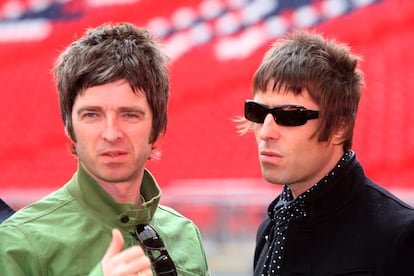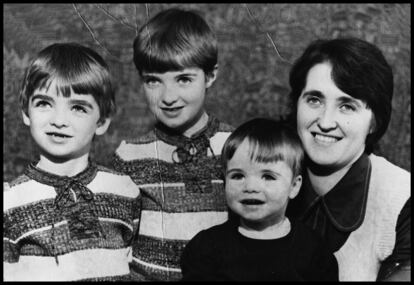Oasis reunion: The story of a comeback denied a thousand times
The Gallagher brothers have announced a series of concerts in 2025, marking 15 years since their acrimonious split

Noel and Liam Gallagher may not have been in a room together for 15 years, but the power of that unmatchable feeling called nostalgia and the prospect of a colossal payday have broken down the wall: Oasis are back. The British group have resisted a reunion from the time they split in 2009, but on Tuesday morning through a message on their social networks, the band that put bad-tempered rock back on the sales charts has announced that they are getting back together for a 2025 tour. Oasis will play concerts at Cardiff Principality Stadium (July 4 and 5), Manchester Heaton Park (July 11, 12, 19 and 20), London Wembley Stadium (August 25, 26 and August 2 and 3), Edinburgh Murrayfield Stadium (August 8 and 9) and Dublin Croke Park (August 16 and 17). Next year marks the 30th anniversary of one of the group’s two most successful albums (What’s the Story) Morning Glory? (1995), which includes their most famous hit, Wonderwall.
The announcement marks the end of 15 years of fights and insults, which at first were amusing but later became tiresome and increasingly hostile (“Noel is quite dark. But so was Hitler,” Liam once said of his brother). For years, the brothers have been adamant they would not perform together again, especially Noel: “It wouldn’t make sense,” he said. Now, that stance has changed. Only two people count in this story, Noel (57) and Liam Gallagher (51), dysfunctional, quarrelsome, obnoxious, egomaniacs… And also the creators of a handful of songs that marked the 1990s. Oasis were the pride of British rock and roll at a time when the U.S. grunge scene was beginning to falter: Their first album, the muscular Definitely Maybe, was released in August 1994, four months after the death of Nirvana frontman Kurt Cobain.
NME and Melody Maker, the two UK weekly music magazines that sold thousands of copies in the 1990s, were salivating over the antics of these bushy-browed hooligans, who rarely appeared without a can of beer in their hands and a ready quip. They told stories about how, on a ferry to Amsterdam, they met some fans of English soccer club West Ham. As the Gallagher brothers are lifelong Manchester City supporters, Liam began throwing empty cans of beer at them (and there were a lot of them to throw). The West Ham fans played the same game until, inevitably, they came to blows. Liam spent two days in a Dutch jail cell. Another prominently featured tale is that of Noel “doing lines in a toilet at 10 Downing Street” when he met Tony Blair, the Cool Britannia prime minister, in 1997, although many of the musicians who supported the Labour leader later disowned him. You could fill a book with the brothers’ antics, although the repetition might end up being tedious. The UK press even found some worthy rivals for their bad boys: Blur.

Musically, Oasis offered an irresistible pastiche: the memorable melodies of the Beatles, the boogie swagger of T. Rex, the turbidity of the Velvet Underground, the brazenness of the Rolling Stones... You can take any of the group’s hits and draw fairly reasonable similarities with songs by the aforementioned bands. But from their rendition as fans of the rock classics, they sounded genuinely Oasis. Rock and Roll Star, Live Forever, Wonderwall and Don’t Look Back In Anger are all Oasis style identifiers. Liam’s aggressive vocals, stretching out the vowels, Noel’s thick guitars. Nobody wanted to be rock stars more than them. In concert, they didn’t need to dance or do pirouettes. Their attitude as rough working-class boys was enough. Liam sang nailed to the stage, with his hands clasped behind his back as if waiting to be cuffed, his legs slightly bent and his neck stretched out with his mouth pointing at the microphone. When he finished his vocals, he would wave a tambourine and prowl the stage arrogantly with a smirk on his face. Noel barely moved either, fiddling with his oversize guitars and giving off the presumptuous attitude of someone who exercises complete control as composer and boss when it comes to making decisions. The rest of the band adopted the same attitude: what’s the point, if just saying fuck between songs is enough.
In the 2000s their albums became denser, bordering on the psychedelic. Then in 2009 came the famous dressing room fight at a concert in Paris, after which Noel left the group accusing his brother of “an intolerable level of verbal intimidation and violence.” It was said that the vocalist threw a guitar at Noel, although some versions also add “a plum” to the assault. After the split, the fraternal psychodrama began, with a profusion of family dirty laundry and insults. Since then the brothers have pursued solo careers, lower in quality and, above all, popularity than Oasis’ heyday. Liam first with Beady Eye and then under his own name, and often with ex-members of Oasis in the line-up; and the guitarist (and at this stage lead singer) under the name of Noel Gallagher’s High Flying Birds. In recent times, both have liberally sprinkled their sets with Oasis hits.

Liam has always been the more interested in a reunion and has fluctuated between negativity about the prospect and green shoots of hope. In 2019, in an interview with this newspaper, he said: “I get asked all the time when Oasis is coming back. It doesn’t look good right now. I’m starting to think that Noel really doesn’t like me. I always thought that when he messed with me he was joking, that he really liked me. But I have the feeling that it’s true that he doesn’t like me. It’s a shame. I love him. We’re brothers. I have another brother and he doesn’t talk to him either. Noel is in his own fucking world right now. I don’t know what’s going on with that bastard. He’s not happy making cosmic pop. He’s not happy being the leader. He’s not happy having all the money. He’s not happy with his beautiful girlfriend. He’s not happy with his £80 million. He’s not happy with anything. What the fuck makes him happy? He’s going to end up playing in pubs because Oasis fans are going to get bored with him.” A year later, in 2020, Liam was on a high: “I intend to retire as [a] solo artist after album no3 as I have just had a call from my brother begging me to start Oasis again in 2022,” he said in a tweet, although whether it was meant as a joke remains unclear. A few months ago, in March 2024 in an interview with EL PAÍS, he was lukewarm: “It’s possible, but it won’t happen this week.”
Noel, however, had remained steadfast in his refusal to consider an Oasis comeback. The most encouraging thing he said was to the BBC in January 2023: “You should never say never, but it would have to take an extraordinary set of circumstances. That’s not to say that those circumstances would never come about.” Those circumstances were clearly not in place a few months later, when Liam attempted a reunion with his brother to celebrate the 30th anniversary of Definitely Maybe in 2024. Noel did not accept, and the singer has been touring the emblematic songs of that debut album to sold-out crowds since June. Once again, the triumph of nostalgia. Now Noel has also succumbed. The UK tabloids, in anticipation of the material the reunion will provide them, claim that the rebirth of Oasis could generate £400 million and that each of the Gallaghers will pocket around £60 million. Music journalist Tim Jonze, who worked at NME and is now at The Guardian, wrote on Monday what an Oasis reunion in 2025 will mean for the United Kingdom: “Changing the world might be a bit of a stretch, but a few nights of drunken unity in a bitterly divided country? Who wouldn’t want to be there for that?”
Sign up for our weekly newsletter to get more English-language news coverage from EL PAÍS USA Edition
Tu suscripción se está usando en otro dispositivo
¿Quieres añadir otro usuario a tu suscripción?
Si continúas leyendo en este dispositivo, no se podrá leer en el otro.
FlechaTu suscripción se está usando en otro dispositivo y solo puedes acceder a EL PAÍS desde un dispositivo a la vez.
Si quieres compartir tu cuenta, cambia tu suscripción a la modalidad Premium, así podrás añadir otro usuario. Cada uno accederá con su propia cuenta de email, lo que os permitirá personalizar vuestra experiencia en EL PAÍS.
¿Tienes una suscripción de empresa? Accede aquí para contratar más cuentas.
En el caso de no saber quién está usando tu cuenta, te recomendamos cambiar tu contraseña aquí.
Si decides continuar compartiendo tu cuenta, este mensaje se mostrará en tu dispositivo y en el de la otra persona que está usando tu cuenta de forma indefinida, afectando a tu experiencia de lectura. Puedes consultar aquí los términos y condiciones de la suscripción digital.









































